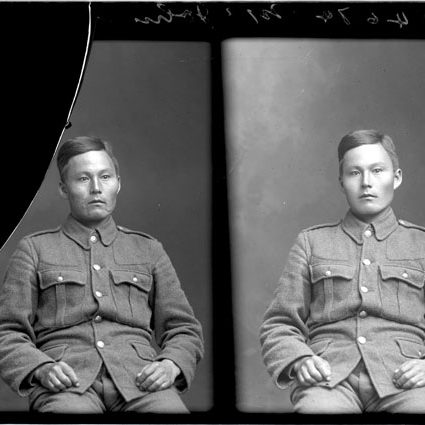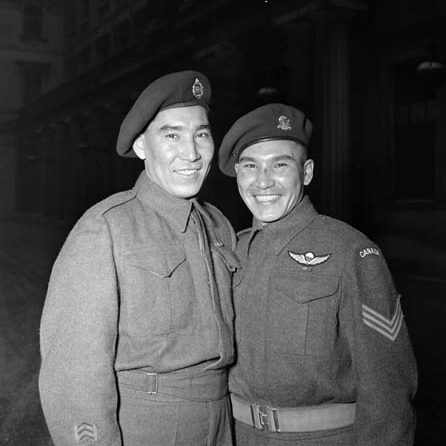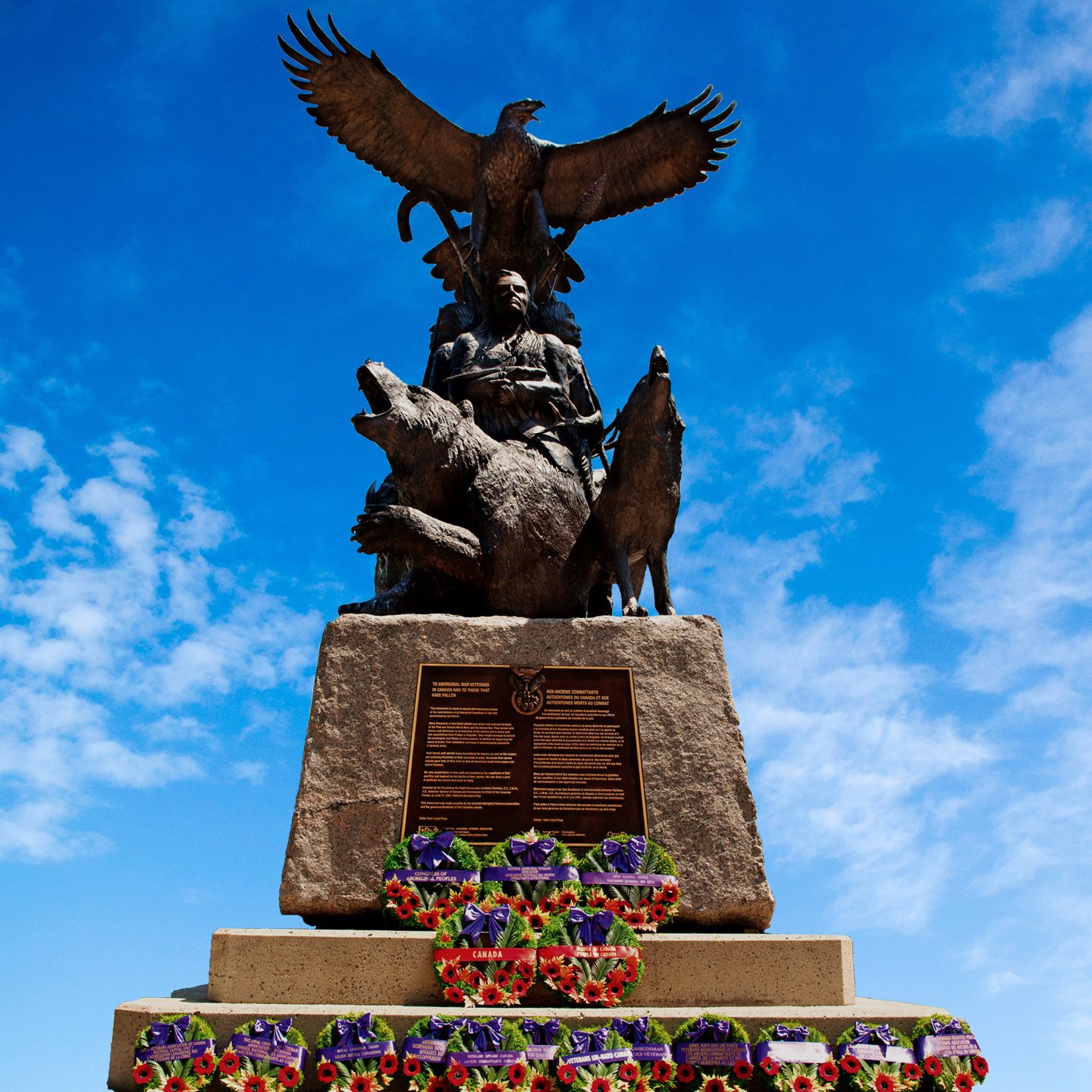First Nations, Inuit and Métis Veterans and their Families
First Nations, Inuit and Métis Peoples’ history of service to Canada predates the Canadian military — and even Canada’s existence as a country. It begins with Crown-Indigenous relations pre-Confederacy European settlers in the war of 1812, and spans generations of sacrifice amid historical injustices that limited the personal rights and freedoms of First Nations, Inuit and Métis Peoples.1 These include but are not limited to the Sixties Scoop, relocation of Inuit Peoples to the High Arctic and the residential school system.
However, although they continue to experience the long-term impacts of these and other injustices, Indigenous Peoples continue to serve as members of the Canadian Armed Forces (CAF). As of 2019, at least 2,742 currently serving CAF members are First Nations, Inuit or Métis.2
This webpage recognizes and honours the contributions of First Nations, Inuit, and Métis Veterans and Veteran Families. To learn more about the Atlas Institute’s work with Indigenous Veterans and Families, jump to Working together to address your health information needs.

Source: The Rooms, item E 29-45
Honouring and recognizing Indigenous Veterans and Veteran Families
- During the Second World War, First Nations Peoples in Canada — especially those from the Cree Nation — served as “code talkers,” developing codes based on First Nations languages to communicate with fellow soldiers, who would then translate them into English. This prevented intercepting enemy forces from understanding what was being communicated.3
- The exact number of First Nations Peoples who enlisted in each of Canada’s major military efforts is unknown, as is the number of Inuit and Métis Peoples who enlisted. Available estimates underreport the true number of First Nations, Inuit, and Métis Peoples who have served. As of 2019, the estimates are as follows4–6:
- At least 4,000 First Nations Peoples (one-third of First Nations men aged 18 to 45) enlisted in the First World War.
- At least 3,000 First Nations Peoples enlisted in the Second World War.
- At least several hundred First Nations Peoples enlisted in the Korean War.
- As of 2023, at least 23% of Canadian Rangers self-identify as First Nations, Inuit or Métis.7
- Many status Indiani soldiers were forced to become enfranchisedii before they were able to sign up to fight in the Second World War.8,9 As a consequence, when they returned home to their communities, they no longer had Indian status.
- Military records for the First and Second World Wars, as well as the Korean War, did not allow service members to be listed as Métis.10
i While “Indian” was historically employed, contemporary language recognizes the importance of cultural specificity and “Indigenous” is now widely adopted to encompass the diverse and distinct identities of these communities.
ii Enfranchisement is a legal process for terminating a person’s Indian status and conferring full Canadian citizenship. Enfranchisement was a key feature of the Canadian federal government’s assimilation policies regarding Aboriginal peoples. 11
The role of culture in healing
The following videos highlight the experiences of Indigenous Veterans.
Accessibility features: Closed captioning is available for these videos. To enable this feature, select CC in the bottom-right of the video player.
Content warning: Please note that these real-life stories may be difficult to watch as it discusses topics including the LGBT purge, military sexual trauma, moral injury and other types of loss associated with service. If you need support, please visit our resources page.
Sharp Dopler
Watch this testimonial video exploring the experiences of Two-Spirit Indigenous Veteran Sharp Dopler, including the impacts of the LGBT purge.
Shauna Mulligan
In this digital story, told in her own words, Shauna Mulligan reflects on being an Indigenous Veteran and woman struggling with mental and physical injuries sustained during service, and how community support and Indigenous culture has played a role in her own healing.
Veterans and their Family members can learn about culturally relevant initiatives and services available to them by visiting the Government of Canada website.
Veterans and their Family members may be eligible to receive trauma-informed health and cultural support through Indigenous Services Canada’s Residential Schools Resolution Health Support Program.
The Veterans Affairs Canada Indigenous Engagement Team can offer guidance about available benefits and services and how to access them. To learn more about Veterans Affairs Canada services, check out the Guide to services for First Nations, Inuit, and Métis current and former service members.
Learn more
Learning about the experiences of First Nations, Inuit and Métis Veterans is an important part of Canada’s journey towards truth and reconciliation. Together with community members, we’ve compiled a list of webpages, books, videos, podcasts and courses you can use to better understand the history and experiences of these communities. This list is not meant to be a comprehensive offering of all learning materials available but rather offers some suggestions to get started.
Online resources
- Indigenous Veterans (Veterans Affairs Canada): Learn about the long, proud and complex history of military service of First Nations, Inuit and Métis people in Canada.
- Remembering Indigenous soldiers (National Centre for Truth and Reconciliation): Learn about the interconnections between the legacy of the Canadian residential school system and how Indigenous children were among many who joined the fight overseas during the First and Second World Wars and the Korean War.
- Indigenous peoples and Canada’s military (by John Moses for the Canadian War Museum): Learn about impacts of war and service for Indigenous communities, particularly for those in residential schools.
- Indigenous Veterans Initiative (Last Post Fund): Learn about an initiative to find the unmarked graves of Indigenous Veterans and watch a short documentary film about this process and the work of Gloria LaPlante (Kawacatoose First Nation) who aims to remember the Veterans in her community.
- Holding our breath: Creating a sacred space for remembrance (Adrian Stimson): Read a post by artist Adrian Stimson [Siksika (Blackfoot) Nation] on his exhibitions and experiences, including his submission for the National Monument for Canada’s Mission in Afghanistan, informed by his conversations with soldiers, some of whom were First Nations.
- Mission accomplished: Marking the resting places of Indigenous Veterans: Read more about the Last Post Fund’s Indigenous Veterans Initiative and its work to ensure graves of Indigenous Veterans are properly marked.
Multimedia
- Indian Braves: This film, available for free on CBC Gem, explores experiences of Indigenous members during and after the World Wars, as well as the Korean War.
- Forgotten Warriors: A film that shares the first-hand testimony of Indigenous military members during the Second World War, their experiences after and their healing journeys. Available for free on the National Film Board of Canada website.
- Mind Beyond the Mission: Exploring identity and culture: Podcast episode exploring how Indigenous culture and military service can intersect and interact with each other.
Reading
- A Commemorative History of Aboriginal People in the Canadian Military by P. Whitney Lackenbauer et al.: Learn about the extensive contributions of Indigenous Peoples to the Canadian Armed Forces across history.
- From the Tundra to the Trenches by Eddy Weetaltuk: Read the personal story of Eddy Weetaltuk’s journey, from growing up in northern Quebec to serving in the Canadian Forces.
- For King and Kanata: Canadian Indians and the First World War by Timothy C. Winegard: Explore the contributions and experiences of Indigenous service members during and after the First World War.
- Oka: A Convergence of Cultures and the Canadian Forces by Timothy C. Winegard: Learn more about the 1990 Oka Crisis in Quebec and the relationships between Indigenous Peoples, the government and the Canadian Forces during this time.
General learning about Indigenous experiences in Canada
- Indigenous Canada (University of Alberta course): Learn about Indigenous histories as well as current issues faced by Indigenous Peoples today through 12 free online modules.
- Indigenous Peoples within Canada: A Concise History, Fifth Edition by Olive Patricia Dickason et al.: Learn about the history of Indigenous Peoples in Canada more broadly, including origin and pre-contact histories through to the present day.
- By Strength, We Are Still Here: Indigenous Peoples and Indian Residential Schooling in Inuvik, Northwest Territories by Crystal Gail Fraser: Read about the experiences of Indigenous students at two residential schools in Inuvik, with a focus on the strength of Indigenous communities.
- The Inconvenient Indian: A Curious Account of Native People in North America by Thomas King: Learn about the impacts of colonialism, Indigenous-settler relations and resilience in North America.
- A Short History of Indians in Canada by Thomas King: Explore the impacts of colonialism on Indigenous Peoples in Canada through a collection of short satirical stories.
- Wînipêk: Visions of Canada from an Indigenous Centre by Niigaan Sinclair: Read about the experiences, challenges and resilience of Indigenous Peoples in Canada, using Winnipeg as a focal example.
Working together to address your health information needs
The Atlas Institute for Veterans and Families wants to collaborate with Indigenous individuals, organizations and communities to create and share information that:
- Supports Indigenous Veteran and Family health and well-being journeys; and
- Raises awareness of Indigenous Peoples’ service in the Canadian Armed Forces and Royal Canadian Mounted Police.
The project team currently includes a First Nations Veteran advisor (Tim O’Loan — Sahtu Dene First Nation, Princess Patricia’s Canadian Light Infantry, Master Corporal [Retired]) and a Métis Veteran advisor (Shauna Mulligan — CAF Reserve, Corporal [Retired]).
Together, we aim to continuously engage Indigenous Veterans and Family members to listen and learn about:
- Ways we could work together
- Your contexts and experiences
- Information about mental health and well-being that would be useful to First Nations, Inuit and Métis Veterans and Families
Preserving the integrity of First Nations, Inuit and Métis data is crucial when collaborating with Indigenous communities. This approach respects Indigenous Peoples’ right to control and manage their data in accordance with their cultural values and sovereignty. Acknowledging the historical and ongoing injustices faced by Indigenous nations, data sovereignty ensures that Indigenous Peoples retain ownership of data* stemming from their traditional knowledge. This not only acknowledges their nationhood but also fosters trust, which is required for true collaboration. Additionally, recognizing Indigenous Peoples’ rights to protect their data sovereignty empowers Indigenous communities and nations to safeguard their traditional knowledge while promoting cultural sensitivity and preventing exploitation (for example, unauthorized use of traditional knowledge or intellectual property gained via consultation).
Atlas acknowledges and is committed to respecting data sovereignty in our engagement with Indigenous Peoples in order to foster an environment that honours Indigenous diversity, sovereignty and self-determination.
*Data refers to information and knowledge about Indigenous individuals, groups, organizations, languages, cultures, beliefs, practices, land and resources. This data can be transmitted orally and generationally or collected and stored digitally by researchers, governmental and non-governmental organizations.
- Government of Canada. Exhibit: Indigenous contributions to the War of 1812 [Internet]. Ottawa: Government of Canada; 2016 Feb 16 [cited 2024 Feb 23]. Available from: rcaanc-cirnac.gc.ca/eng/
1348771334472/ 1607906032957#chp8b - Department of National Defence. Indigenous People in the Canadian Armed Forces [Internet]. Ottawa: Government of Canada; 2019 Feb 26 [cited 2024 Feb 23]. Available from: canada.ca/en/department-national-defence
/news/2017/06/les_peuples_ autochtonesdansles forcesarmeescanadiennes.html - Indigenous Corporate Training Inc. Canadian Indigenous code talkers remain unacknowledged [blog on the Internet]. Saanichton: Indigenous Corporate Training Inc; 2020 Nov 5 [cited 2024 Feb 23]. Available from: ictinc.ca/blog/canadian-indigenous-code-talkers-remain-unacknowledged
- Indigenous Corporate Training Inc. 14 facts you may not know about contributions of Indigenous Veterans [blog on the Internet]. Saanichton: Indigenous Corporate Training Inc; 2021 Nov 11 [cited 2024 Feb 23]. Available from: ictinc.ca/blog/14-facts-you-may-not-know-about-contributions-of-indigenous-veterans
- Veterans Affairs Canada. Indigenous Veterans [Internet]. Ottawa: Government of Canada; [date unknown] [cited 2024 Feb 23]. Available from: veterans.gc.ca/eng/
remembrance/people-and-stories /indigenous-veterans - Government of Canada. Crown-Indigenous Relations and Northern Affairs Canada. Indigenous contributions during the First World War [Internet]. Ottawa: Government of Canada; [date unknown] [cited 2024 Feb 23]. Available from: rcaanc-cirnac.gc.ca/eng
/1414152378639/ 1607908713791 - Department of National Defence. Canadian Rangers [Internet]. Ottawa: Government of Canada; 2023 Apr 24 [cited 2024 Feb 23]. Available from: canada.ca/en/department-national-defence/corporate/reports-publications/proactive-disclosure/secd-april-24-2023/canadian-rangers.html
- Assembly of First Nations. Enfranchisement [Internet]. Ottawa: Assembly of First Nations; 2020 Jan 12 [cited 2024 Feb 23]. Available from: afn.ca/wp-content/uploads/2020/01/12-19-02-06-AFN-Fact-Sheet-Enfranchisement-final-reviewed.pdf
- Indigenous Corporate Training Inc. Indigenous Veterans: Equals on the battlefield, but not at home [blog on the Internet]. Saanichton: Indigenous Corporate Training Inc; 2021 Nov 9 [cited 2024 Feb 23]. Available from: ictinc.ca/blog/indigenous-veterans
- Canadian Geographic. Indigenous Peoples Atlas of Canada: Veterans – Métis [Internet]. Canadian Geographic; [date unknown] [cited 2024 Feb 23]. Available from: indigenouspeoples
atlasofcanada.ca/article/veterans - Assembly of First Nations. Plain Talk 5: Indian Act — Glossary [Internet]. Ottawa: Assembly of First Nations; [date unknown] [cited 2024 Feb 23]. Available from: education.afn.ca/afntoolkit/web-modules/plain-talk-5-indian-act/glossary
FIND MORE RESOURCES
Browse the Knowledge Hub for more evidence-based information, fact sheets, reports and tips.

